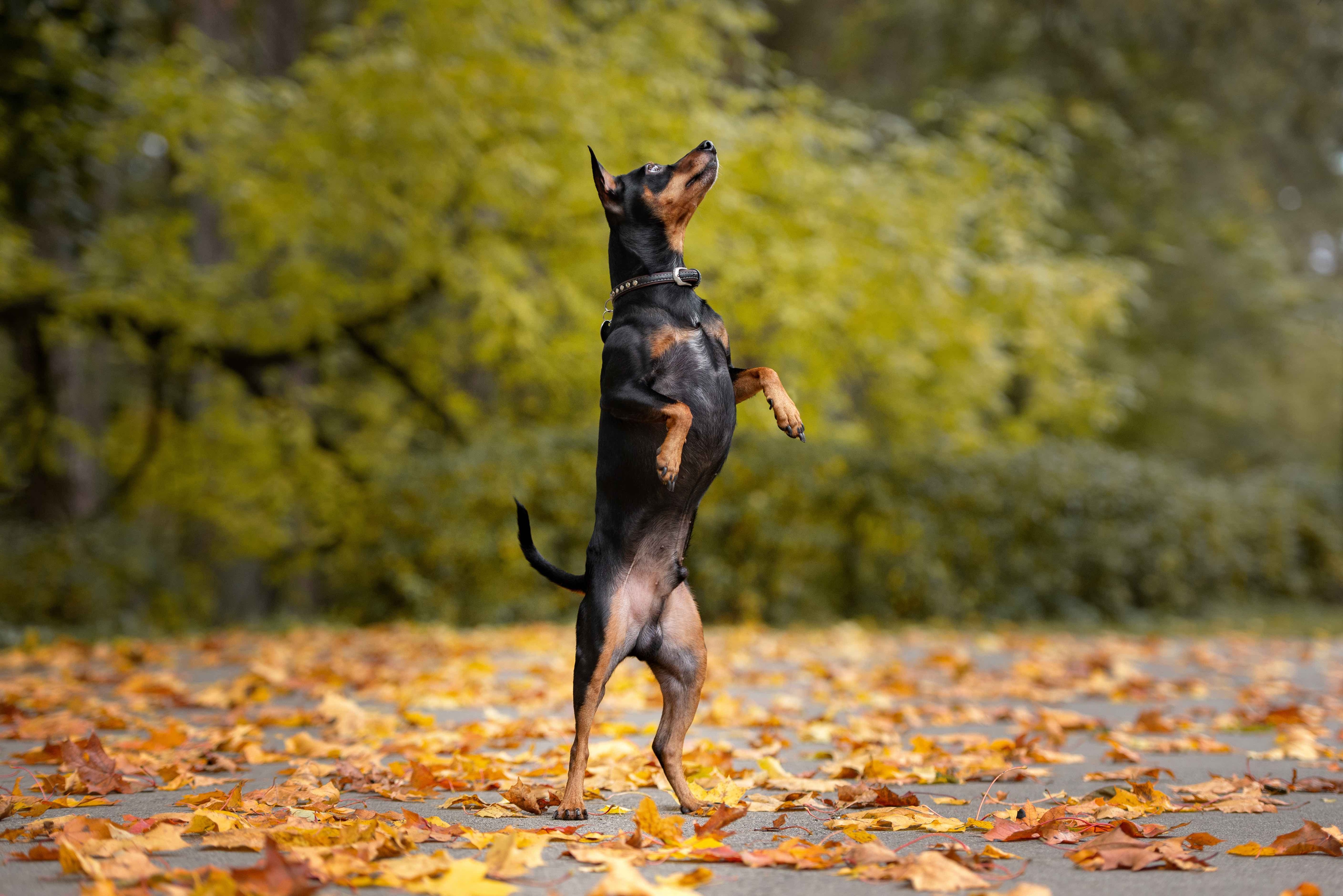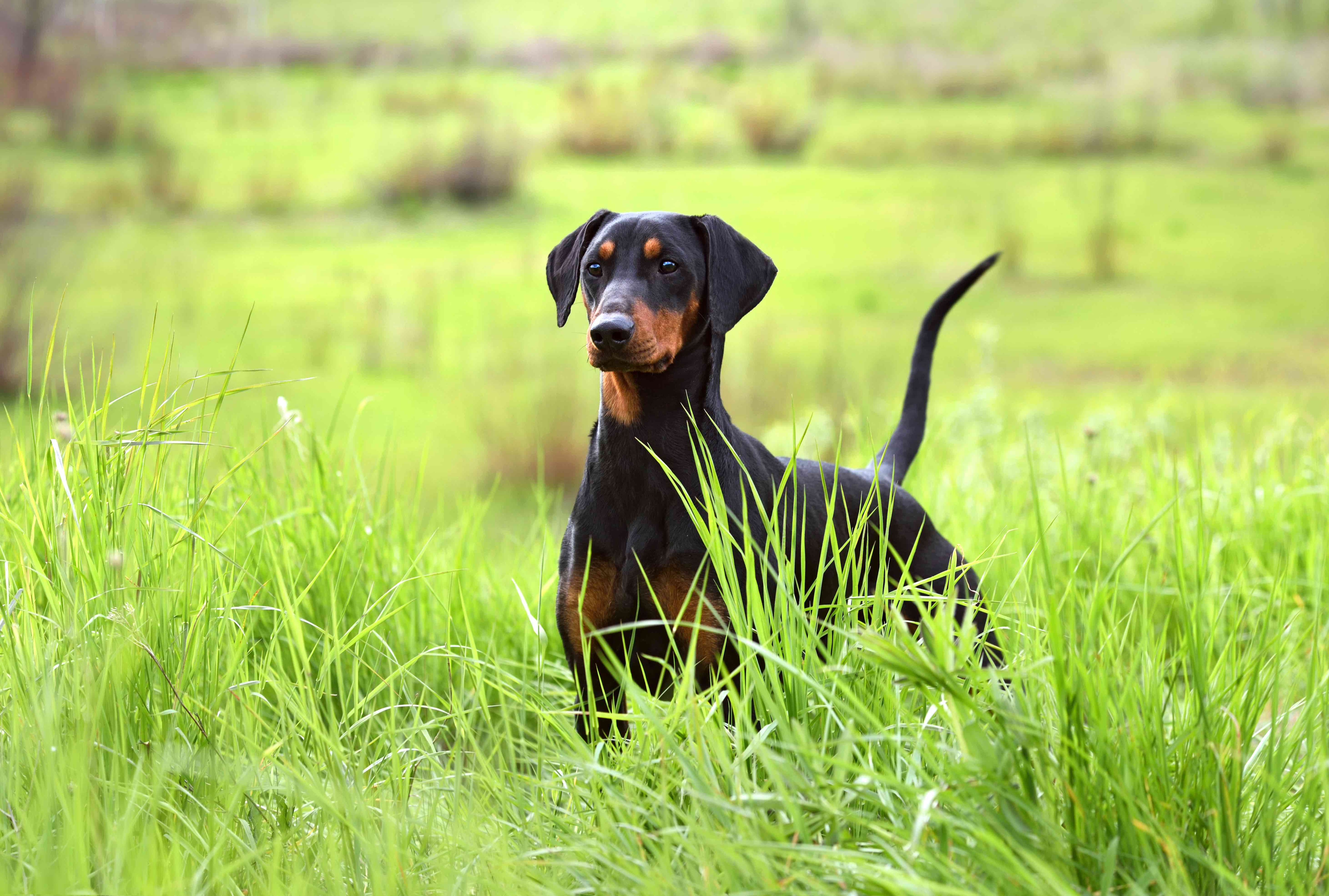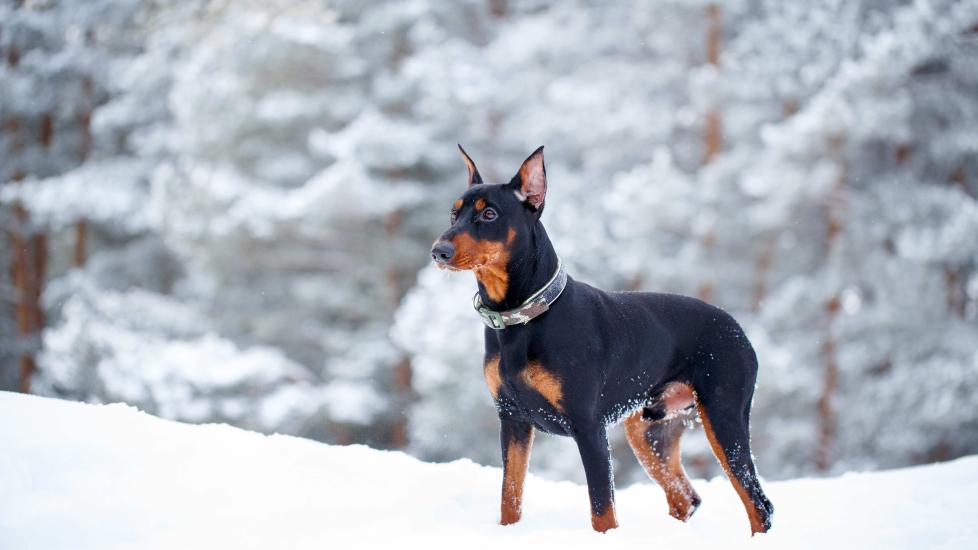German Pinscher
The German Pinscher originated in Germany, where the breed was selectively bred to work as guardians and hunt rodents on farms. The dogs nearly went extinct following the World Wars, and their survival can be traced back to one German breed enthusiast—Werner Jung—and his black and red German Pinscher.
Adult German Pinschers typically stand between 17 and 20 inches at the shoulder and weigh 25–45 pounds. They are sometimes confused with another German breed, the Doberman Pinscher, but German Pinschers are smaller (Dobermans can reach 60–100 pounds).
Like Dobermans, German Pinschers are robust and agile dogs that love to play, and they can be great with children with proper training and socialization.
Caring for a German Pinscher
These lively dogs love playing games, going on walks, and anything that gets their brain and body working. German Pinschers adore their family and form a strong bond with their people, showering them with playful energy and cuddles. Their high intelligence level comes with a streak of independence and they require positive, consistent training.
German Pinschers can be high-energy, so expect to go on vigorous walks, engage in plenty of playtime, and provide enrichment activities to keep them mentally stimulated. A fenced yard is a must when they are outside and unsupervised—their history as hunters mean they maintain a strong prey drive.
German Pinscher Health Issues
German Pinschers are generally healthy and live 12–14 years on average. But like all breeds, they have a predisposition to certain health conditions. Pet insurance is always recommended to help offset the high cost of veterinary visits.
Hip Dysplasia
Hip dysplasia is a malformation of the hip joint that causes pain and mobility issues. Treatment ranges from anti-inflammatory medications to surgery, depending on severity. Weight management, joint supplements, and limiting strenuous activity can help prevent the condition from progressing.
Eye Conditions
German Pinschers can develop a few eye conditions, including:
- Cataracts: Thickened lenses in the eyes that result in decreased vision and eventual blindness.
- Corneal dystrophy: An inherited condition in which crystals form on the cornea, also leading to vision loss.
Regular eye exams are important for early detection and treatment. Cataracts can be corrected with surgery, but there’s no treatment for corneal dystrophy. Monitor your dog's vision and seek immediate veterinary attention if you notice any symptoms, including:
-
Rubbing or scratching of the eyes
-
Changes in eye color
-
Changes in pupil size or shape
-
A cloudy pupil in one or both eyes
Von Willebrand Disease (vWD)
Von Willebrand disease is a hereditary disorder that makes it difficult for blood to clot properly. Because of this, dogs with vWD have an increased bleeding risk after injury or surgery. Ask your German Pincher breeder if they’ve tested your pup’s parents for vWD.
What To Feed a German Pinscher

German Pinschers have a lot of energy, and keeping them fueled for their adventures requires a high-quality diet tailored to their needs.
Choose a dog food with real meat protein (like beef, chicken, or salmon) as the first ingredient. But remember: Puppies, adults, and seniors have different nutritional requirements. Match your dog’s food to their life stage to ensure they get the right balance of nutrients.
Work with your veterinarian to find the right dog food for your German Pinscher.
How To Feed a German Pinscher
German Pinscher puppies under 1 year old should eat up to four small meals throughout the day to support their rapid development. Adult and senior dogs can eat twice or three times per day. Use a slow feeder bowl if your dog eats too quickly.
Aim to feed your dog at roughly the same times each day to regulate their digestive system. Offering food in the mornings and evenings establishes a predictable schedule for them. Avoid leaving food out for your dog all day (free-feeding), as this can lead to obesity.
How Much Should You Feed a German Pinscher?
German Pinschers, with their energetic spirits and athletic builds, require a well-balanced diet to stay healthy. Specific feeding amounts can vary based on individual factors, but there is a framework to help you determine the right amount for your dog:
-
Life stage: Puppies, adults, and seniors have different nutritional needs. Puppies need more frequent, smaller meals for growth, while adults typically do well with two meals a day. Seniors may benefit from smaller, more frequent meals for easier digestion.
-
Activity level: Highly active Pinschers burn more calories and require larger portions than less active ones. Adjust portions based on your dog's daily exercise routine.
-
Body size and weight: A larger German Pinscher will naturally require more food than a smaller one. Monitor your dog's weight regularly and adjust portions as needed to maintain a healthy body condition.
Nutritional Tips for German Pinschers
While a high-quality, breed-appropriate diet is the foundation for your German Pinscher's health, certain supplements can offer additional support if your veterinarian recommends them.
-
Glucosamine and chondroitin: These naturally occurring compounds help maintain cartilage health and lubrication in joints, which is important for an active breed like the German Pinscher.
-
Omega-3 fatty acids: These fats have anti-inflammatory properties and can benefit joint health and mobility.
-
Probiotics: These live bacteria help maintain a healthy gut microbiome, aiding digestion and immune function. They can be especially helpful for pups adjusting to new diets or dogs with sensitive stomachs.
-
Prebiotics: These non-digestible fibers feed the good bacteria in the gut, also promoting healthy digestion and nutrient absorption.
-
Biotin: This B vitamin plays a role in skin and coat health, supporting hair growth and preventing dryness.
Behavior and Training Tips for German Pinschers
German Pinscher Personality and Temperament
German Pinschers are always up for adventure and are eager to please. Their intelligence shines through in their love for training and challenges. But remember: their boundless energy needs an outlet through regular exercise and play.
German Pinschers don't necessarily need a job in the traditional sense, but they enjoy having a purpose. Activities such as agility training, obedience competitions, or even playful tasks like fetching the newspaper can provide this purpose. They can even excel in working jobs, like herding sheep, with the proper training.
A well-trained and socialized German Pinscher can be good with children and other pets. But, like with any dog, interactions between German Pinschers and kids should always be supervised.
German Pinscher Behavior
Well-socialized German Pinschers are confident and courageous dogs that are not usually afraid of new situations or people, so anxiety isn’t typically a concern. Puppy and human play dates at a young age will help prevent fearfulness and reactivity.
They tend to bark to alert when they sense something unusual. Excessive barking can be managed with training and positive reinforcement.
The German Pinscher’s playful nature can sometimes lead to digging, especially if they’re bored or lacking exercise. Providing your dog with designated digging areas and regular exercise can help curb this behavior.
German Pinschers are always up for adventure and are eager to please. Their intelligence shines through in their love for training and challenges.
German Pinscher Training
German Pinschers are very smart. They can understand cues quickly and are very receptive to training when positive reinforcement methods are used. Keep training sessions short and engaging to prevent boredom and maintain their attention. Like any dog, consistent training and patience are key to success.
German Pinscher puppies need to be socialized consistently from a young age, where they are exposed to different people, pets, and environments.
If you face challenges or need guidance, seek help from a board-certified veterinary behaviorist or a licensed certified trainer.
Fun Activities for German Pinschers
-
Nose work and scent detection
-
Long walks
-
Games of fetch with a Frisbee
German Pinscher Grooming Guide
While German Pinschers need lots of activity, they’re a low-maintenance breed in terms of grooming.
Skin Care
German Pinschers don't require special skin care. If your dog needs a bath (about every six to eight weeks or so), use a gentle shampoo to prevent drying their skin.
Coat Care
German Pinschers have a short, smooth, and dense coat. While tangles aren’t an issue, this breed is a moderate shedder. Weekly brushing is sufficient to remove dead hair and keep their coat shiny.
During periods of heavier seasonal shedding (in the spring and fall), you might need to brush your German Pinscher two or three times a week to manage the loose hair.
Eye Care
Regular, gentle cleaning your German Pinscher’s eyes with a soft, damp cloth and lukewarm water is sufficient for removing any dust or debris. Avoid using harsh chemicals or soaps near their eyes.
Some German Pinschers might be prone to minor tear staining under their eyes. This is typically caused by excess tear production or slight anatomical variations in their tear ducts. Consult your veterinarian if the staining seems excessive or if your dog is experiencing any discomfort.
Ear Care
Weekly ear cleanings are recommended to remove dirt, debris, and wax buildup. Use a gentle ear cleaning solution and make sure to dry the ears thoroughly when you’re done.
Be on the lookout for signs such as redness, swelling, discharge, bad odor, head shaking, or scratching around the ears. These could indicate an ear infection and require veterinary attention.
Considerations for Pet Parents

Before welcoming a German Pinscher into your life, consider if you can be the perfect partner for this vibrant and energetic breed. They thrive in active homes with plenty of space to run, play, and explore. Daily walks, engaging playtime, and opportunities for mental stimulation are important to keep them happy and fulfilled. If you lead a sedentary lifestyle or live in a confined space, this breed might not be the best fit.
Their short coat makes grooming relatively low-maintenance with weekly brushing and occasional baths. However, their high energy level demands dedicated training and consistent positive reinforcement. Be prepared for an enthusiastic companion who might need patience and guidance to channel their energy and independent streak.
German Pinschers can be wonderful family dogs with proper socialization and training. However, their strong prey drive necessitates caution around smaller pets and neighborhood critters.
German Pinscher FAQs
Is a German Pinscher the same as a Doberman?
While both German Pinschers and Dobermans are athletic dogs with sleek coats, they are distinct breeds. Dobermans are taller and leaner with longer snouts, while Pinschers are more compact and have shorter snouts.
Do German Pinschers drool a lot?
German Pinschers aren't known for excessive drooling. They might drool a bit when excited or hungry, but it's generally not a major concern.
Are German Pinschers easy to train?
The intelligence of a German Pinscher makes them moderately easy to train. However, their high energy and independent streak require patience, consistency, and positive reinforcement.
Are German Pinschers affectionate?
German Pinschers are big softies at heart! They bond deeply with their families and shower them with love and affection. Expect cuddles and plenty of enthusiastic greetings at the door.
Featured Image: Adobe/DragoNika
